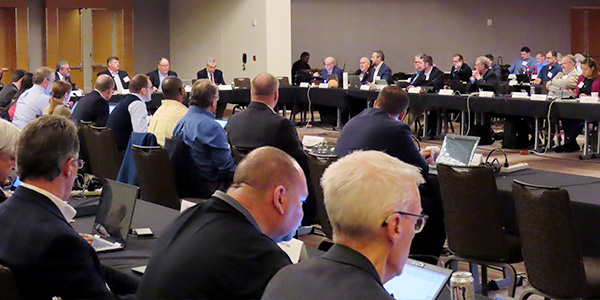By Holden Mann
ATLANTA — NERC’s new Reliability and Security Technical Committee (RSTC) held its first meeting Wednesday with a focus on introducing the body’s membership and laying the groundwork for beginning operations in June.
NERC’s Board of Trustees approved the creation of the RSTC last year, merging the Planning, Operating and Critical Infrastructure Protection committees, which have more than 120 members combined. (See NERC Board OKs Committees Merger.) The new group’s 34 members were approved at the Feb. 6 board meeting in Manhattan Beach, Calif. They include representatives from 11 industry sectors, as well as 10 at-large members chosen by the RSTC’s Nominating Subcommittee. (See “Final RSTC Roster Accepted,” NERC Board of Trustees Briefs: Feb. 6, 2020.)
Focusing on Functions
For the initial meeting, RSTC Chair Greg Ford of Georgia System Operations and Vice Chair David Zwergel of MISO left most of the committee’s ostensible business to the three retiring committees, which concluded their final full meetings the same day (though they will meet briefly in June to finish handing over their work to the RSTC). Instead, the gathering featured briefings from the heads of the old committees on their existing structures and their ongoing work, followed by a discussion on how to consolidate their functions in the new organization.
Answering a question posed by numerous participants at previous meetings, Ford and Zwergel confirmed that the retiring committees’ existing subgroups will continue their ongoing projects with their current membership in the short term, reporting to the RSTC. Over the longer term, the leaders shared their initial broad thoughts on how the committee’s project pipeline might work, with projects organized into three main workstreams — technical services and modeling, assessments and analysis, and security. However, they emphasized that final arrangements have not been worked out and that input from members and industry will shape the process going forward.
Members Step Forward
Committee members suggested a number of ideas, such as assigning an RSTC liaison for each subcommittee that would be responsible for communicating between it and the larger body. Another significant concern raised was the logistical challenges of shrinking down the existing structure. Brian Evans-Mongeon of Utility Services Inc., the outgoing CIPC chair and at-large member of the RSTC, suggested that the new committee consider extending its meetings to accommodate the workload — for instance, by adding a two-hour introductory session like the joint sessions currently held by the OC, PC and CIPC.
“Given the fact that we’re trying to fit the agenda of three groups into an eight-hour span, it seems to me that kind of pre-session could [still be] of value,” Evans-Mongeon said.
“A pre-session is always an option,” Ford agreed, adding that the executive committee will also consider holding online informational meetings each quarter prior to the full meeting, similar to NERC’s Member Representatives Committee. NERC Chief Engineer Mark Lauby said that this can also be a solution for those members whose organizations’ travel policies might not permit them to attend longer meetings.
Members of NERC leadership attending the meeting encouraged the new committee to build on the work of its predecessors, while looking for any areas for further streamlining.
“As I attended the meetings yesterday and this morning, it was a little melancholy, to a degree, to listen to the closing statements from the chairs of the OC, PC and CIPC,” board Vice Chair Kenneth DeFontes said. “But at the same time, I come into this room with a great deal of optimism. And as I sat through the meetings, I saw evidence … that suggested to me the concept … should be very successful, because we’re going to be able to accomplish the same work, but hopefully do it more efficiently and more effectively.”




